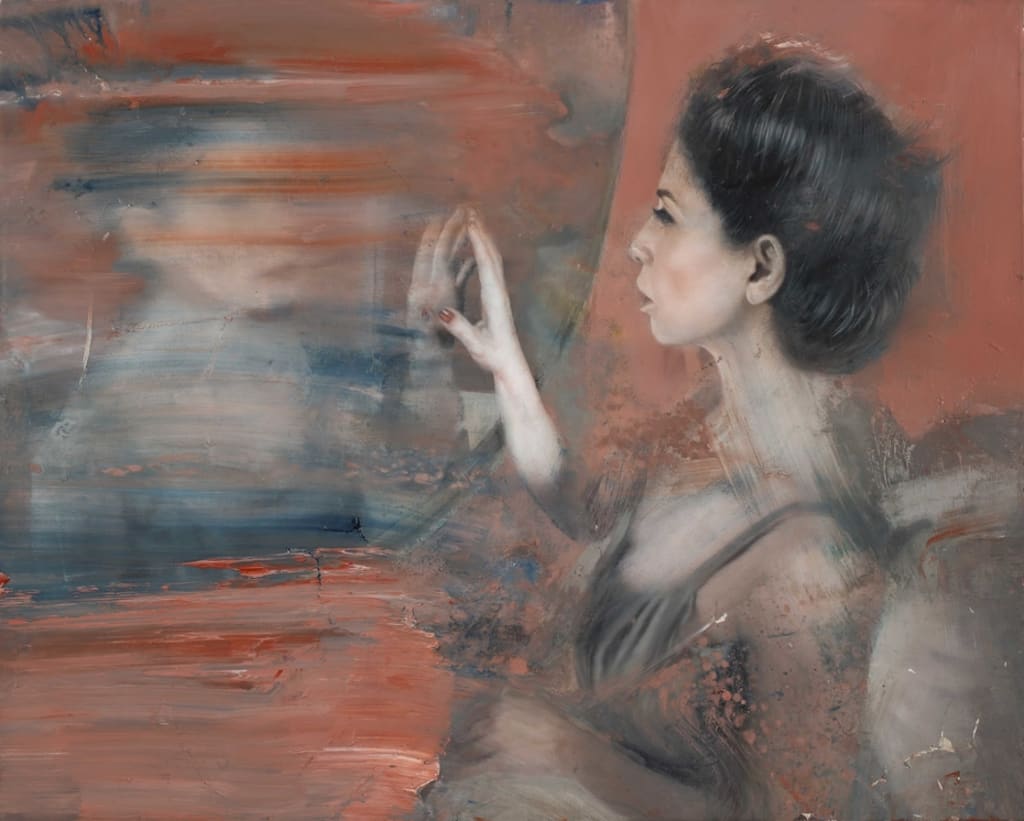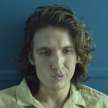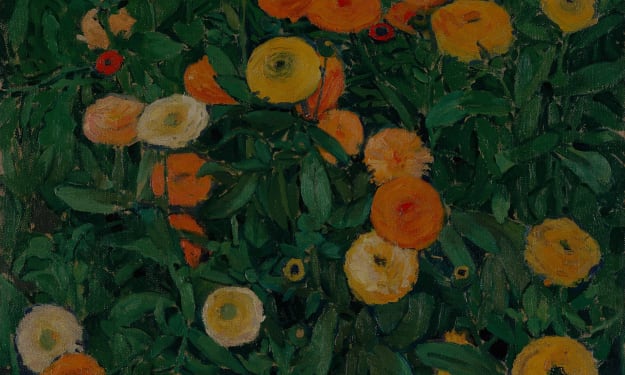
Mary lifted the reverse-strapped pack at her stomach like a caring mother—not with child, but on her way to an orphanage on the outskirts of the desert town. There were no passengers by the time she reached her stop; the bus wheels squealed as it reversed course. She waited for three hours. She figured she better get started while it was early in the day and she still had phone battery.
Six hours in, her hair turned from brown to black with sweat. There was a lookout on the side of the road about a mile from her destination. From there, she could see a small cluster of buildings she hoped was her new home and, on the horizon, a dark shape that reminded her of the mining scar in the hills above her hometown. Below, like its shadow, was a reservoir. Upon it, final lights of the setting sun shone.
She grunted, cried and labored on. When she reached flat ground, she cried again from happiness. All her struggles, she thought, were now behind her. The shape of the home came to her: a couple of trailers and a small, converted church whose steeple pierced the cool sky, a split-rail fence. She saw a boy there who waved to her. She would recall his face later: an ultra-thin nose, narrow face and wide-set eyes.
Mary knocked on the door of the main building. The woman who opened it was in her fifties, blonde and attractive. At her hip, she held a child, a child whose face appeared to have been melted, each feature drooping down. Mary focused on the woman. “Hi, I’m Mary. I’m the new girl.”
“Where have you been?” the woman looked back behind her. She pointed off to someplace hidden by the door.
“What? I was at the bus station at 10, like-like you told me to,” the nylon now slipping through her slick fingers.
“No. We weren’t supposed to pick you up,” the woman stepped forward and pulled the door with her, watching it latch.
“I’m sorry, somebody was supposed to—” Mary regained herself, “I’m sorry, but that’s what I was told. How was I supposed to get her if not—”
“Mary, Mary quite contrary…” she shook her head. “We didn’t know you’d be coming by bus.”
Mary protested, “I’m sorry. I think I talked to Jess—” looking at the negative space of the woman in the doorway, for some answer, for someone to come and resolve this.
“She’s out. Jess is not even here.”
“Sorry but I called.” The bag fell at her feet, creating the sound of water spilled from a glass slapping the floor all at once.
“We didn’t get it.”
“But you knew I was supposed to be here, right? You have my number.”
“Well, you’re here now,” she smiled and opened the door. “Let’s not make a bigger deal of it than we ought to, shall we? I’m Rebecca. You’re the new girl. Mary, you said.”
In a dimly lit, rectangular room, the children waited on their knees and crossed legs as they were silently introduced to Mary—each one like the first she’d seen, a new variation of sagging, sallow skin, abnormal growths, thin, tubular limbs, narrowed shoulders, weedy necks that barely, it seemed, supported the weight of the head. Each smiled weakly upon hearing their name—that was the worst of it. There was no laughter, no play, no fidgeting even. Once they were presented, they went back to milling around, slowly reading and staring at their toys.
“Wasn’t there another boy?” Mary asked. “I saw him outside.”
“I should hope not. No one is allowed outside after 8. No, no this is everyone. My twelve little disciples.”
“But I saw—”
“How does your garden grow?” Rebecca sang with a quiet smile.
There were no windows to look out to see if he was still out there, playing in the yard, or whether he existed at all. Perhaps it was possible that in her extreme exhaustion and dehydration, Mary had hallucinated the thirteenth child. Wasn’t it?
As Rebecca put the children to bed, Mary helped herself to a glass of water from the tap. She gasped for breath, poured another one and sank into a wooden chair. The second one, she drank slower and left a faint metal taste by the time she finished it. She nestled her bag in the bedroom Rebecca had pointed out to her and took a shower in the cramped, square bathroom off the hall. Just when she’d slipped into the mindless comfort of warm water pouring over her face, she heard Rebecca singing softly in the hallway Mary, Mary quite contrary, how does your garden grow? With silver bells and cockleshells. Suddenly, she stopped. Mary heard nothing else for the rest of her quickened shower, surprised to find the hallway empty upon exiting. Footsteps approached as she brushed her hair on the bed in her towel. A knock at the door.
“Come in,” Mary said.
Rebecca froze. “Oh my. I thought you said ‘come in.’”
“I’m sorry. Two women, I thought—”
“I’ll let you get decent,” Rebecca said and left to wait outside.
As Mary dressed, she asked, “Is Jess coming back tonight?”
“You’d have to ask her.”
Mary opened the door to Rebecca polishing off a glass of water herself. From the bed, to Rebecca who stood and searched the room as if it were the first time she’d seen it, Mary said, “Can I ask you a sensitive question?”
“Of course.”
“Did something cause the children’s facial differences?”
“Facial differences? I don’t know how to answer that. God is quite the artist when he shapes his children.”
“Yes, but—the differences from normal.”
“Normal? My, well, we can’t all have thy fearful symmetry.”
“What? That’s not it at all. There’s some shared condition, isn’t there? Or just a cultural problem with parents abandoning—”
“These poor children’s parents died. You’ve been here for less than a day and you’re already drawing conclusions about the people of this town. I’ll have you know my great-grandfather founded this town and he’d put you on your back for saying such things about its people. Want me to put a mirror up to you and start making assumptions?”
Mary took a deep breath, her shoulders falling. “I think I just need to get some sleep.”
In the night, she woke to intense nausea. She rushed to the bathroom and turned on the switch, but the light was out. She heaved over the toilet. Finally, the feeling passed. She stood up, looked in the mirror and gasped—her hands raced up to catch the bags of flesh dripping off her face. Once she made contact, it appeared as normal. I must have been still half-dreaming, she thought. The fluttering sound of feet, was that real?
She went to check on the kids, behind each door finding snores and the rises and fall of chests. Satisfied, she turned to go back to sleep, but thought, how many children did I just see? Five in the first room, four in the second and four in the last? Mary looked again. Five, five, four. That was thirteen, not twelve. Her eyes, weaker than ever before, pressed into the darkness. Again, thirteen. She breathed fast and heavy, returning to the first room. She stepped in and reached to touch the first child on the shoulder when a hand gripped her own.
“What are you doing?”
She and Rebecca retreated to the kitchen, where Mary, still looking towards the rooms, whispered, “I counted thirteen kids.”
“Why are you counting the kids? Who sent you?”
“I wasn’t—I didn’t mean to. I just wanted to check—”
“Who sent you?”
“I went to check in on them. Nobody sent me—I, I heard rustling.”
“Look. One, two, three, four…one, two, three, four…one, two, three, four. That makes 12.”
“But I thought I saw—”
Her nausea returned at dawn, if it ever left entirely. She made sure to start a load of laundry and clean the kitchen table before escaping to the bathroom to vomit. She finished in time to greet the children as they woke and help them prepare breakfast.
After serving lunch and curing a sore throat, Mary’s forehead froze, knees cracking like an icy pond and her energy drained. She stumbled through the home looking for Rebecca to ask her leave but could not find her. To a bleary kitchen of children eating before her like a flock, she said, “If Rebecca asks where I am, tell her I’m feeling sick.” She dragged herself to bed and collapsed.
In the afternoon, the sky darkened, the clouds forming the shape of droplets without dropping, and the children followed Mary into her room, one after another. Little Katie sang Mary had a little lamb, and the boys and girls spoke in hushed tones: Will she ever get used to it here?…I don’t know, it seems she’s worse off than Jess when she started…Was white as snow…Jess would know what to do… Where is Jess? She went looking for you. You didn’t see her out there?…Maybe she’s safe…Was sure to go…I can’t find anyone on the road. I think we’re on our own from here on out…What about her…Look at her. The help she’s brought so far…The lamb love Mary so¬…Shh, I hear the storm door. You better get out of here…Katie, shh. Don’t cry.
Mary awoke to a dim half-light. The cries from the children outside told her it was still day. She rose and dragged herself down the hallway. At the far end, she found a door left ajar. “Rebecca,” she whispered. She let go of the doorknob and walked down the stairs, the darkness lapping her body and swallowing her up. One, two, three, four…ten steps down the and Mary finally found the bottom. There was no switch. She waded out further, further. Finally, her hands struck the bottles, plastic bottles, heaps and heaps of full plastic bottles, a full wall’s worth as high as she could reach. She looked back up at the sliver of light. A round shadow appeared at the edge and disappeared.
She raced up the stairs, slipping and falling, her knee clattering against the steps. At the top of the steps, she called for Rebecca. She slumped into the bathroom, pooled water into her hands and splashed her face. The door lock clicked.
“Bloody Mary, Bloody Mary, Bloody Mary…” it was the voice of Rebecca, but deeper, much…
“Stop that!”
“Bloody Mary, Bloody Mary, Bloody Mary, Bloody Mary…”
“Stop!”
“Bloody Mary, Bloody Mary, Bloody Mary!”
There was movement in the mirror. It was the little boy from outside. He was perfect, perfect little boy, he looked just like her. Looked just like her. It was her little boy, she realized, what he’d look like if not for…if not for…She screamed…if not for her and her bottle. The eyes, the thin skull, the flat lip, that’s what he would have looked like if he had made it.
There was a shadow behind her, then a handle placed into her hand, and a hand around her own. The knife was driven, driven into her stomach and turned in paddle strokes. She fell to floor, but not in the mirror.
Because she knew if the dead could be found in it, there she'd be—waiting to surface.
About the Creator
Paul Fey
I just want to be the best writer you know.
https://paulfeywritings.cargo.site/






Comments
There are no comments for this story
Be the first to respond and start the conversation.